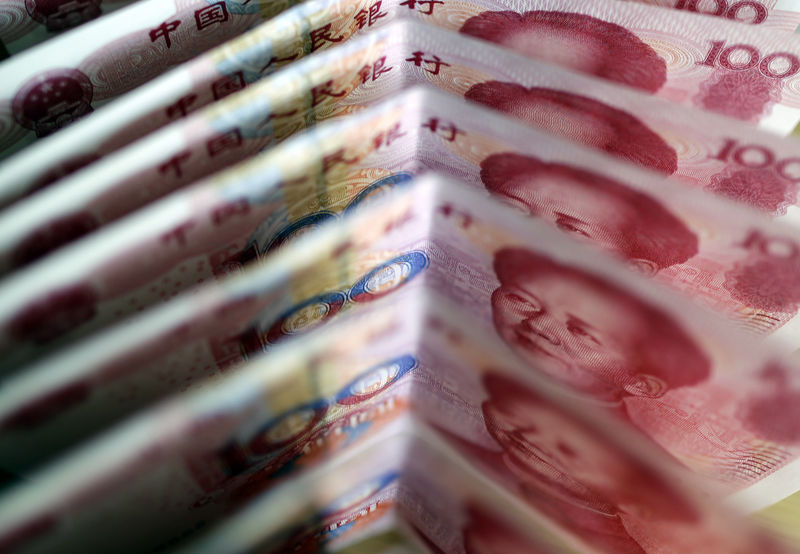By Laura Matthews and Shankar Ramakrishnan
NEW YORK (Reuters) - Global companies with China businesses are increasingly issuing renminbi debt to finance operations there, as for the first time in six years it has become cheaper to do so rather than raising money in U.S. dollars.
In recent years, multinationals have tended to raise financing in dollars or their local currencies, which they then converted to renminbi, or the yuan, to lend to their Chinese subsidiaries. Near-zero U.S. interest rates helped to make it cheaper to do so.
But since the second half of last year, the funding advantage in favor of renminbi has become more pronounced as the Federal Reserve has kept interest rates high while China has had to cut them as its growth slowed after COVID-19.
The divergence in rates is now allowing companies to save as much as 150 to 250 basis points in interest costs by raising money in renminbi, according to traders and corporate advisers.
The lower costs and the added benefit of being able to avoid currency risks by raising the funds where they need them has led to a surge in interest in derivatives called cross-currency swaps and bonds denominated in the Chinese currency, according to these market experts.
"It means for those who may have renminbi needs, borrowing in renminbi becomes attractive," said Desiree Pires, managing director and head of corporate sales for the UK at Standard Chartered (OTC:SCBFF).
The move to raise money in the Chinese currency shows how global companies are navigating the many surprises thrown by the economy in the aftermath of the pandemic. They are also trying new ways to bring down their cost of capital in a high interest-rate environment. It also underscores the growing acceptance of the Chinese currency in international markets.
One currency trader at a blue-chip U.S. company said that in the past, companies would not use renminbi as a funding source because it was not very liquid, but that this perception was now changing.
The window for the trade, however, may close in the coming months. The renminbi's funding advantage would start to evaporate if the Fed starts cutting interest rates later this year.
POPULAR DERIVATIVES
Cross-currency swaps, which allow companies to exchange cash flows from one currency to another at a defined rate, have been increasing in recent months as China’s rate cuts since June pushed the differential between U.S. and Chinese government bond yields to their widest levels in many years.
As of April 1, a one-year cross-currency swap between U.S. dollars and offshore Chinese renminbi, or CNH, was trading 2.28% lower than U.S. rates, said Amol Dhargalkar, global head of corporates at risk management advisory Chatham Financial.
That means a company could save as much as 228 basis points by borrowing in CNH versus dollars. This differential has widened by 300 basis points from the same period in 2022.
Dhargalkar said he started seeing demand for offshore renminbi cross-currency swaps kick off late last year. "It was not a positive opportunity for them before. Today, it is," he said.
Data about the over-the-counter market is patchy. In February, the most recent month for which data is available, there was $5.5 billion in new USD/CNH cross-currency swaps contracts, up from $4.7 billion in December, according to the Hong Kong Exchange's OTC Clear, which clears some cross-currency swaps.
In another sign of this trend, renminbi-denominated debt issued by non-Chinese companies, called panda bonds, totaled nearly $50 billion this year, and is on pace to beat the $143 billion record total in 2023, said George Sun, who runs BNP Paribas (OTC:BNPQY)' global markets business for Greater China.
NAVIGATING UNCERTAINTY
With the difference in rates allowing companies to match assets and liabilities in the same currency relatively cheaply, more companies are looking to lock in the benefits for longer.
Most China cross-currency swap trades were for maturities up to 3-5 years, but demand for CNH for up to 10 years is also growing, said Antoine Jacquemin, managing director of corporate derivatives sales at Societe Generale (OTC:SCGLY).
By swapping into renminbi or the currency of their local operations, companies were able to protect the dollar value of their local cash, said Garth Appelt, head of foreign exchange and emerging markets derivatives, at Mizuho Americas.
"They're a little worried about the value of all the things they have invested, not just the dividend payments, not just the exports," he said.
The strategy also allows companies to avoid volatility in the currency's value if there are any changes in trade policy after the U.S. presidential election in November, said BNP's Sun.

Former President Donald Trump, the Republican candidate challenging President Joe Biden in the Nov. 5 U.S. election, imposed tariffs on Chinese products during his White House term, ending decades of free trade policy. Biden maintained those tariffs but has them on review.
"When you have uncertainty about what's coming up in the trade situation and you know you have business to do in both China and the U.S., you want to minimize that currency and rates mismatch," Sun said.
